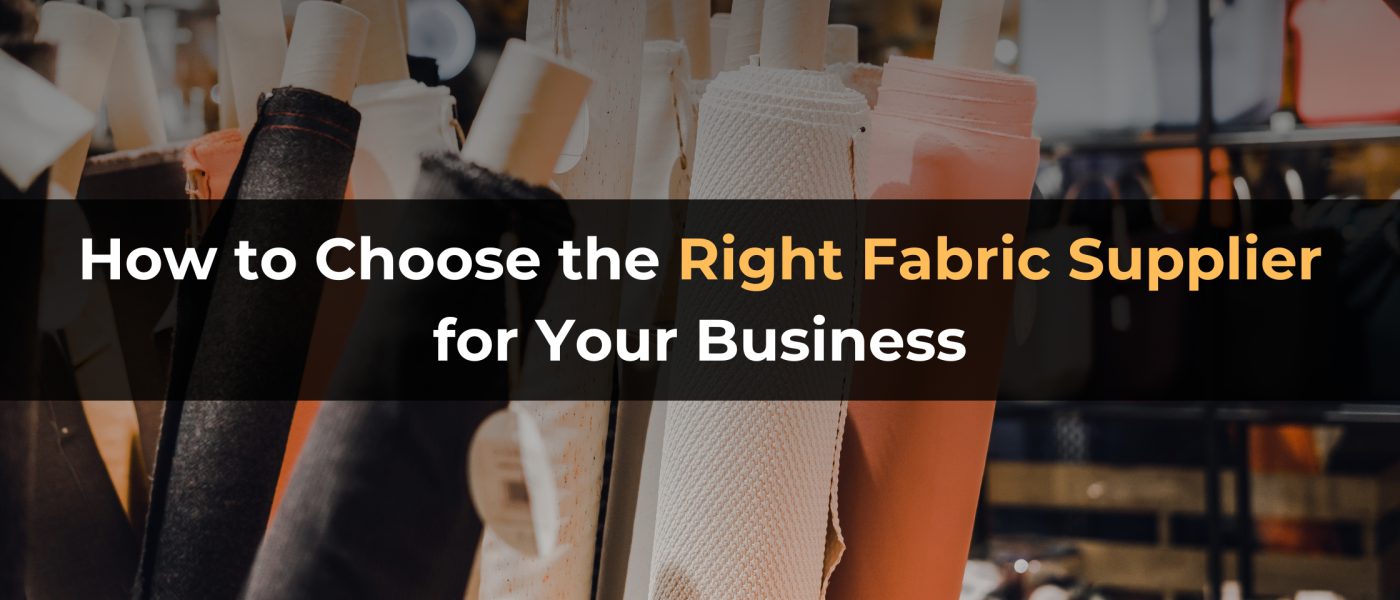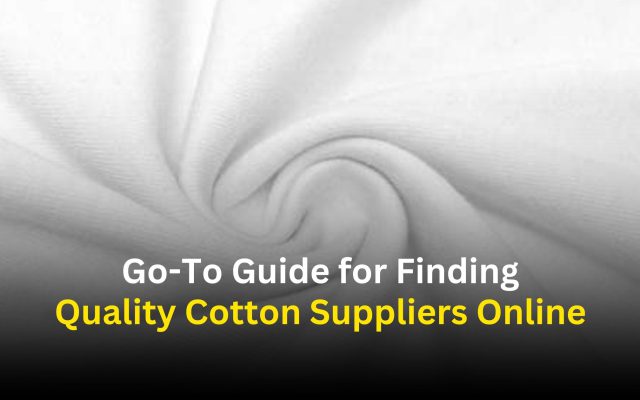Choosing the right fabric supplier is a critical decision for any business in the textile or apparel industry. Whether you’re a small boutique owner or a large-scale manufacturer, your supplier determines the quality, consistency, and cost of your products. With India being a global leader in textile production, finding the right fabric supplier India can open doors to high-quality materials at competitive prices. In this article, we’ll guide you through the process of evaluating and selecting a reliable fabric supplier to meet your business needs.
Why Choosing the Right Fabric Supplier Matters
Your fabric supplier isn’t just a vendor; they’re a key partner in your supply chain. The wrong choice can lead to production delays, inconsistent quality, and even damage to your brand’s reputation. Here’s why finding the right supplier is essential:
- Quality Assurance: A reliable supplier ensures consistent fabric quality, which is crucial for maintaining your product standards.
- Timely Delivery: Delays in fabric supply can halt your production line, leading to missed deadlines and lost revenue.
- Cost Efficiency: The right supplier balances quality and affordability, helping you manage your production costs effectively.
- Flexibility: A good supplier adapts to your needs, whether you require bulk orders or custom fabrics.
Finding the right fabric supplier involves careful research and evaluation. Let’s dive into the key steps to help you make an informed decision.
Steps to Choose the Right Fabric Supplier
1. Define Your Fabric Requirements
Before searching for a supplier, clearly define your fabric needs. Consider the following:
- Fabric Type: What type of fabric do you need (e.g., cotton, silk, polyester)? Do you require specialty fabrics like organic cotton or blends?
- Quality Standards: What level of quality do you expect? For instance, fabrics for luxury apparel will have different requirements than those for industrial use.
- Volume and Frequency: Determine how much fabric you need and how often. Are you looking for a one-time purchase or an ongoing supply?
- Certifications: Do you require specific certifications, such as OEKO-TEX or GOTS, to meet environmental or ethical standards?
Clearly defining these factors helps you narrow down suppliers who align with your business needs.
2. Research Fabric Suppliers
To find reliable suppliers, start by exploring different sources:
- Online Directories: Platforms like Texchange Global list verified fabric suppliers. You can filter by region, product type, and certifications.
- Trade Shows: Textile trade fairs and industry events are excellent places to meet fabric suppliers, view samples, and establish connections.
- Referrals: Ask for recommendations from industry peers or business contacts who work with reputable suppliers.
- Search for Local Suppliers: India has a vast network of fabric manufacturers across regions like Gujarat, Tamil Nadu, and Punjab. Research suppliers in these hubs for specific types of fabrics.
When researching, focus on suppliers with a good reputation, positive reviews, and a proven track record.
3. Evaluate the Supplier’s Reputation and Experience
The experience and reputation of a supplier speak volumes about their reliability. Here’s how to assess these factors:
- Years in Business: Suppliers with a long history are often more reliable, as they’ve had time to establish processes and build trust.
- Client Portfolio: Ask about their previous or current clients. Suppliers working with established brands are likely to meet high standards.
- Reviews and Testimonials: Look for feedback from past clients to understand the supplier’s strengths and weaknesses.
A trustworthy fabric supplier in India will be transparent about their experience and willing to provide references.
4. Check Fabric Quality
Fabric quality is paramount for your business’s success. Always request fabric samples before placing a bulk order. Evaluate the samples for:
- Texture and Feel: The fabric should feel right for its intended use, whether it’s soft for apparel or sturdy for upholstery.
- Durability: Check for strength, colorfastness, and resistance to wear and tear.
- Appearance: Ensure the fabric matches your specifications in terms of color, pattern, and finish.
High-quality samples reflect the supplier’s commitment to excellence.
5. Assess Production Capacity
Your supplier must be able to meet your volume requirements, especially if you plan to scale your business. Ask about their:
- Production Capacity: Can they handle bulk orders without compromising quality?
- Lead Times: How quickly can they fulfill your orders?
- Flexibility: Are they willing to accommodate rush orders or small batch production?
A supplier with the right capacity ensures a smooth supply chain.
6. Verify Certifications and Standards
If your business focuses on sustainability or ethical practices, certifications are crucial. Common certifications include:
- Global Organic Textile Standard (GOTS): For organic fabrics.
- OEKO-TEX Standard 100: Ensures fabrics are free from harmful substances.
- Fair Trade Certification: Indicates ethical labor practices.
Suppliers with these certifications demonstrate their commitment to quality and responsibility, making them ideal partners for eco-conscious businesses.
7. Discuss Pricing and Payment Terms
Price is a major factor, but it shouldn’t come at the cost of quality. When discussing pricing:
- Compare Quotes: Request quotes from multiple suppliers to benchmark costs.
- Negotiate Bulk Discounts: Many suppliers offer lower rates for large orders.
- Clarify Payment Terms: Understand payment schedules, methods, and any penalties for delays.
The goal is to find a supplier who offers competitive pricing without compromising on quality.
8. Evaluate Logistics and Delivery
Timely delivery is critical for maintaining your production schedule. Assess the supplier’s logistics capabilities by asking:
- Shipping Costs: Are shipping costs reasonable, and do they vary for bulk orders?
- Delivery Timelines: How long does it take for orders to be delivered?
- Tracking and Updates: Does the supplier provide real-time tracking and updates on shipments?
Reliable delivery ensures that your supply chain runs smoothly.
9. Build a Long-Term Relationship
Once you’ve chosen a supplier, focus on building a strong partnership. Open communication, regular feedback, and trust are essential for long-term success. A good fabric supplier will prioritize your needs, helping you scale your business and maintain high standards.
Why India is an Ideal Source for Fabric Suppliers
India is a global hub for textiles, offering a rich variety of fabrics and skilled manufacturers. Choosing a fabric supplier in India has several advantages:
- Diverse Fabric Options: From handloom to high-tech fabrics, Indian suppliers cater to a wide range of needs.
- Competitive Pricing: Indian suppliers offer high-quality fabrics at affordable prices due to cost-effective production methods.
- Sustainability Focus: Many Indian suppliers specialize in organic and eco-friendly fabrics, meeting the demand for sustainable textiles.
- Global Reach: Indian fabric suppliers are experienced in exporting materials worldwide, ensuring seamless logistics for international buyers.
With a strong reputation for quality and innovation, India is a top destination for businesses seeking reliable fabric suppliers.
Conclusion
Choosing the right fabric supplier is a vital step in building a successful textile or apparel business. By defining your needs, researching suppliers, and evaluating factors like quality, capacity, and certifications, you can find a reliable partner who aligns with your business goals. For businesses looking to source from India, the vast network of skilled fabric suppliers in India provides access to high-quality materials at competitive prices.
By following these tips and focusing on long-term partnerships, you can ensure a steady supply of top-notch fabrics, helping your business grow and thrive in the competitive textile market.




